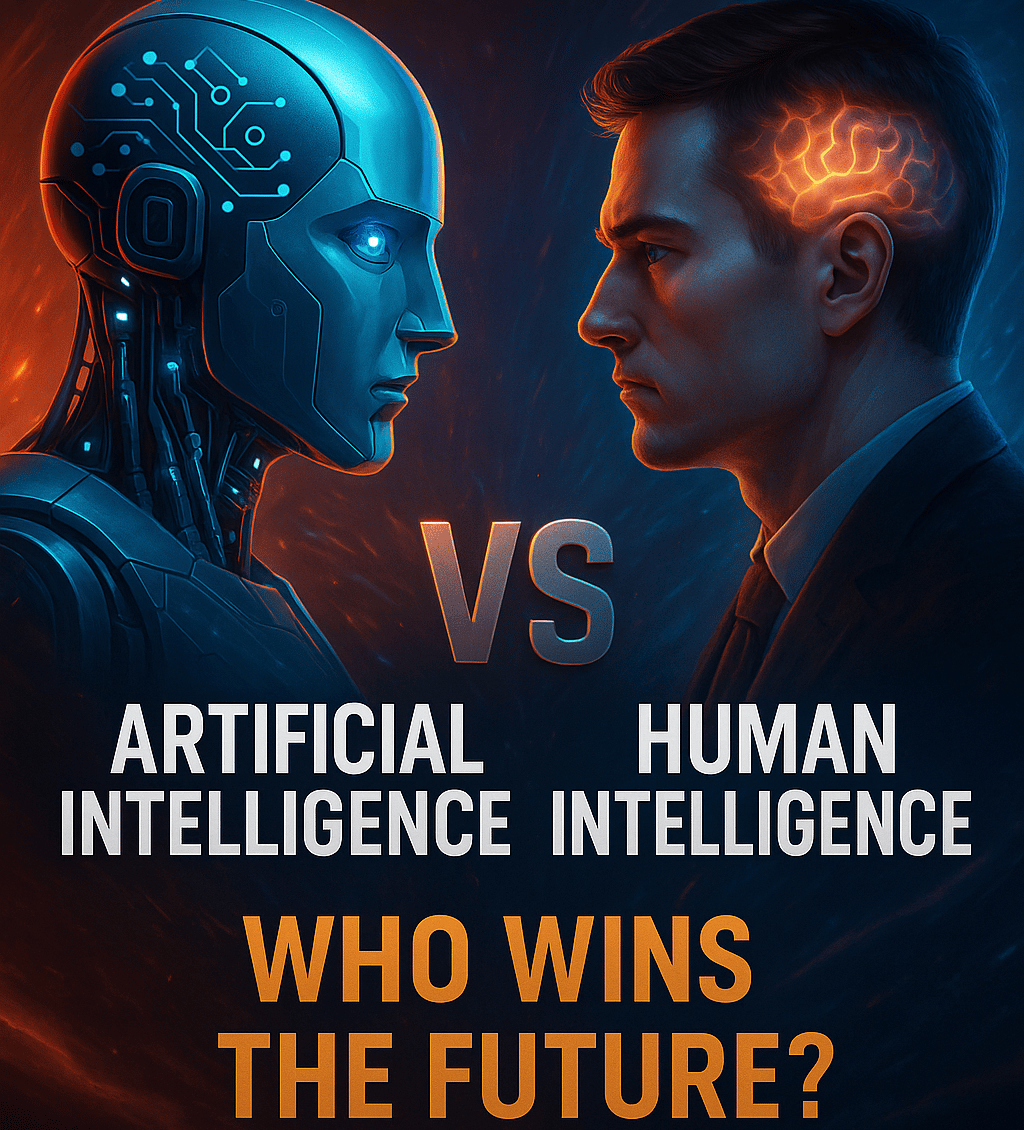🤖 Artificial Intelligence vs Human Intelligence: Who’s Really Smarter?
Dive into the captivating comparison of Artificial Intelligence vs Human Intelligence. Understand their strengths, differences, and future roles in shaping our world.
TECHNOLOGY


🤖 Artificial Intelligence vs Human Intelligence: Who’s Really Smarter?
Meta Description: Dive into the captivating comparison of Artificial Intelligence vs Human Intelligence. Understand their strengths, differences, and future roles in shaping our world.
Introduction: The Age-Old Question, Rebooted
We've all asked it — Will AI ever replace humans? Or better yet, Is Artificial Intelligence already smarter than us?
In today’s tech-driven world, the conversation around Artificial Intelligence vs Human Intelligence is more relevant than ever. From chatbots writing essays to robots performing surgeries, AI seems to be racing ahead. But does that really make it "intelligent"? And where does that leave the human brain — the original supercomputer?
Let’s break it down and find out who’s winning the intelligence game.
1. What is Intelligence, Anyway?
Before we pick a side, we need to understand what "intelligence" means.
Human Intelligence is the ability to learn, reason, adapt, empathize, and apply knowledge in varied situations.
Artificial Intelligence is the simulation of these processes by machines and algorithms — but within a set boundary or trained data.
AI excels at specific tasks (narrow intelligence), while humans have general intelligence and creativity.
2. Human Intelligence: The Power of Emotion and Adaptation
Humans are biologically equipped for emotional reasoning, social connection, and abstract thinking.
Strengths of Human Intelligence:
Emotional intelligence: Understanding feelings, tone, and context.
Creativity: Writing novels, composing music, inventing ideas.
Moral reasoning: Ethics, empathy, and conscience.
Adaptability: Learning from life, trauma, success, and failure.
Even the best AI lacks the depth of human experience, which shapes our intelligence beyond data.
3. Artificial Intelligence: Speed, Scale, and Super Specificity
AI doesn’t sleep, forget, or procrastinate. It learns from big data, processes it rapidly, and improves with time.
Strengths of AI:
Data processing: Analyzing millions of data points in seconds.
Precision: Performing tasks without fatigue or emotional bias.
Automation: Replacing repetitive or dangerous jobs.
Predictive power: From Netflix recommendations to disease modeling.
For example, in radiology, AI can detect cancer more accurately than the average radiologist.
4. Where AI Falls Short (and Humans Excel)
While AI can beat chess grandmasters and compose pop songs, it still:
Lacks empathy
Can’t make ethical decisions independently
Fails in unfamiliar scenarios
Relies heavily on human-curated data
An AI might know the definition of love, but it has never felt heartbreak. That's a big difference.
5. Human + AI: Better Together?
Rather than asking who’s smarter, a better question might be: How can we complement each other?
In most industries, the future isn’t man vs machine — it’s man + machine.
Doctors + AI: Faster, more accurate diagnoses.
Teachers + AI: Personalized learning.
Writers + AI: Faster drafts, better editing.
AI handles efficiency, while humans bring empathy and ethics.
Supporting Human Creativity
6. The Final Verdict: Intelligence Isn't a Competition
So, who wins?
If it’s about calculation and consistency: AI.
If it’s about creativity, morality, and emotion: Humans.
Instead of replacing human intelligence, AI is here to enhance it.
🧠 AI vs Human Intelligence: A Side-by-Side Comparison
Definition
AI: Simulates intelligence using algorithms and data.
Human: Naturally developed intelligence through biology and evolution.
Learning Method
AI: Learns from massive datasets (machine learning).
Human: Learns through experience, emotion, and environment.
Speed & Efficiency
AI: Extremely fast in calculations and processing.
Human: Slower, but more thoughtful and intuitive.
Creativity
AI: Mimics creativity using patterns in data.
Human: Originates true creativity, imagination, and abstract ideas.
Emotional Intelligence
AI: Cannot feel or understand emotions.
Human: Deeply emotional, empathetic, and socially aware.
Adaptability
AI: Limited to its training; struggles with new or chaotic environments.
Human: Can adapt quickly to new and unpredictable situations.
Decision-Making
AI: Logical and data-driven, but lacks context.
Human: Considers ethics, morality, and emotions.
Error Handling
AI: Can replicate errors if trained on flawed data.
Human: Learns from mistakes, adapts behavior.
Consciousness
AI: No self-awareness or sense of being.
Human: Fully conscious, self-reflective, and aware of identity.
Best Use Cases
AI: Repetitive tasks, data analysis, automation.
Human: Ethical reasoning, complex creativity, social interactions.
Conclusion: Teaming Up with Technology
Artificial Intelligence is undoubtedly powerful — but it's still just a tool. The human mind remains the most complex, creative, and emotionally aware force on Earth.
In the grand match of Artificial Intelligence vs Human Intelligence, maybe the smartest move is not to compete — but to collaborate.
